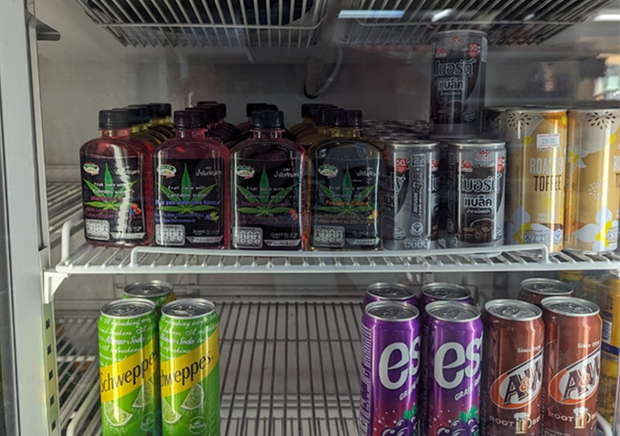Thai Cannabis Drinks Find Their Way to Lao Markets
Source: Radio Free Asia
Thailand’s easing of laws governing the sale of marijuana last year has led to a proliferation of cannabis products on the market, some of which are ending up in stores in neighboring Laos, where authorities aren’t laughing.
In June 2022, Thailand became the first country in Southeast Asia to decriminalize marijuana, prompting a proliferation of related shops across the nation where the drug has always been easy to access, but with the risk of stiff penalties.
Among the more popular products being offered for sale in Thailand are so-called “happy drinks,” or juice and carbonated beverages that under the new law may contain a relatively low dose of up to 0.2% tetrahydrocannabinol, or THC – the main psychoactive ingredient in cannabis.
The drug, which can produce a sense of relaxation and euphoria, was previously only available for medical use to alleviate a variety of conditions, including stress and depression.
But the new market that has sprung up in Thailand is an exception in Southeast Asia where, in most other countries, the use of cannabis and other drugs is illegal and punishable with lengthy jail terms. Some nations, such as Indonesia and Singapore, execute criminals convicted of sale, possession or consumption.
In neighboring Laos, laws prohibit the production, trade and use of cannabis for recreational purposes.
A police officer in the capital Vientiane, separated by the Mekong River from Thailand’s Nong Khai province, confirmed to RFA that only cannabis products “authorized by the Lao Ministry of Health to be used for medical purposes” are permitted for sale in the country.
“The sale of cannabis is prohibited,” said the officer who, like others interviewed for this report, spoke on condition of anonymity due to security concerns. “We regularly inspect shops and stores, and if we see it, we’ll confiscate it.”
But residents told RFA that has not stopped happy drinks produced in Thailand from finding their way across the border and onto the shelves of stores in the capital.
One resident of Vientiane told RFA Lao that happy drinks are now on offer at minimarts along the Mekong River – if one knows where to look.
“In Laos, the sale of this kind of drink is not legal yet,” he said. “Some individuals sell the drink secretly and if they’re caught, they’ll be arrested.”
Another resident of Vientiane, who researches how cannabis can be used for medical purposes, confirmed the availability of the drinks in the city.
“This is a new drink and consumers must be careful,” he said. “It’s available but prohibited by law.”
RFA’s own investigations found happy drinks openly sold at several markets in the capital, including a brand produced by Thai beverage company Srinanaporn Marketing PLC that is marketed as “fruit juice with cannabis water.” It comes in flavors such as mixed berry, pineapple, lychee and lime.
Growing demand among youth
But while the beverages are increasingly available in Laos, several business owners told RFA that smuggling them into the country isn’t worth the trouble, citing tough laws and a clientele largely uninterested in such products.
“I don’t know whether other stores have cannabis juice, but we don’t,” said one store owner in Vientiane. “We don’t import it because it’s against the law.”
A bartender at a nightclub in the capital told RFA that his establishment “serves only beer.”
“Unlike Thailand, Laos still bans cannabis,” he said. “Besides, the fruit drink containing cannabis juice is not popular among Laotians yet.”
They appear to be gaining fashion among members of the country’s younger generation, however.
An officer with Vientiane’s Saysettha District Police Department told RFA that happy drinks containing cannabis and other banned ingredients “are popular among youngsters,” who drink them to “have fun and dance.”
One such drink contains kratom – an herbal substance that can produce stimulant-like effects and is also legal in Thailand.
Oulayvanh Phonesavanh, the deputy head of the emergency department at Vientiane’s Friendship Hospital, recently told local media that around five patients are admitted to her ward each day due to kratom juice poisoning – most of whom are between the ages of 16 and 35.
A young man from Vientiane’s Pak Gneum district said that, despite the risks, happy drinks aren’t going away any time soon.
“As their name implies, happy drinks are often drunk at parties,” he said. “Those who drink them can expect to be happy, excited and having fun all night.”


